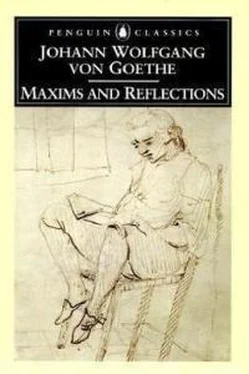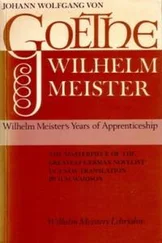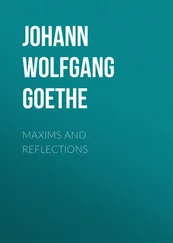329
Besides, in these days the world forces universal culture upon us, and so we need not trouble ourselves further about it; we must appropriate some particular culture.
330
The greatest difficulties lie where we do not look for them.
331
Our interest in public events is mostly the merest philistinism.
332
Nothing is more highly to be prized than the value of each day.
333
Pereant qui ante nos nostra dixerunt! This is so strange an utterance, that it could only have come from one who fancied himself autochthonous. The man who looks upon it as an honour to be descended from wise ancestors, will allow them at least as much common–sense as he allows himself.
334
Strictly speaking, everything depends upon a man's intentions; where these exist, thoughts appear; and as the intentions are, so are the thoughts.
335
If a man lives long in a high position, he does not, it is true, experience all that a man can experience; but he experiences things like them, and perhaps some things that have no parallel elsewhere.
336
The first and last thing that is required of genius is love of truth.
337
To be and remain true to oneself and others, is to possess the noblest attribute of the greatest talents.
338
Great talents are the best means of conciliation.
339
The action of genius is in a way ubiquitous: towards general truths before experience, and towards particular truths after it.
340
An active scepticism is one which constantly aims at overcoming itself, and arriving by means of regulated experience at a kind of conditioned certainty.
341
The general nature of the sceptical mind is its tendency to inquire whether any particular predicate really attaches to any particular object; and the purpose of the inquiry is safely to apply in practice what has thus been discovered and proved.
342
The mind endowed with active powers and keeping with a practical object to the task that lies nearest, is the worthiest there is on earth.
343
Perfection is the measure of heaven, and the wish to be perfect the measure of man.
344
Not only what is born with him, but also what he acquires, makes the man.
345
A man is well equipped for all the real necessities of life if he trusts his senses, and so cultivates them that they remain worthy of being trusted.
346
The senses do not deceive; it is the judgment that deceives.
347
The lower animal is taught by its organs; man teaches his organs, and dominates them.
348
All direct invitation to live up to ideals is of doubtful value, particularly if addressed to women. Whatever the reason of it may be, a man of any importance collects round him a seraglio of a more or less religious, moral, and æsthetic character.
349
When a great idea enters the world as a Gospel, it becomes an offence to the multitude, which stagnates in pedantry; and to those who have much learning but little depth, it is folly.
350
Every idea appears at first as a strange visitor, and when it begins to be realised, it is hardly distinguishable from phantasy and phantastery.
351
This it is that has been called, in a good and in a bad sense, ideology; and this is why the ideologist is so repugnant to the hard–working, practical man of every day.
352
You may recognise the utility of an idea, and yet not quite understand how to make a perfect use of it.
353
Credo Deum! That is a fine, a worthy thing to say; but to recognise God where and as he reveals himself, is the only true bliss on earth.
354
Kepler said: 'My wish is that I may perceive the God whom I find everywhere in the external world, in like manner also within and inside me.' The good man was not aware that in that very moment the divine in him stood in the closest connection with the divine in the Universe.
355
What is predestination? It is this: God is mightier and wiser than we are, and so he does with us as he pleases.
356
Toleration should, strictly speaking, be only a passing mood; it ought to lead to acknowledgment and appreciation. To tolerate a person is to affront him.
357
Faith, Love, and Hope once felt, in a quiet sociable hour, a plastic impulse in their nature; they worked together and created a lovely image, a Pandora in the higher sense, Patience.
358
'I stumbled over the roots of the tree which I planted.' It must have been an old forester who said that.
359
A leaf blown by the wind often looks like a bird.
360
Does the sparrow know how the stork feels?
361
Lamps make oil–spots, and candles want snuffing; it is only the light of heaven that shines pure and leaves no stain.
362
If you miss the first button–hole, you will not succeed in buttoning up your coat.
363
A burnt child dreads the fire; an old man who has often been singed is afraid of warming himself.
364
It is not worth while to do anything for the world that we have with us, as the existing order may in a moment pass away. It is for the past and the future that we must work: for the past, to acknowledge its merits; for the future, to try to increase its value.
365
Let every man ask himself with which of his faculties he can and will somehow influence his age.
366
Let no one think that people have waited for him as for the Saviour.
367
Character in matters great and small consists in a man steadily pursuing the things of which he feels himself capable.
368
The man who wants to be active and has to be so, need only think of what is fitting at the moment, and he will make his way without difficulty. This is where women have the advantage, if they understand it.
369
The moment is a kind of public; a man must deceive it into believing that he is doing something; then it leaves us alone to go our way in secret; whereat its grandchildren cannot fail to be astonished.
370
There are men who put their knowledge in the place of insight.
371
In some states, as a consequence of the violent movements experienced in almost all directions, there has come about a certain overpressure in the system of education, the harm of which will be more generally felt hereafter; though even now it is perfectly well recognised by capable and honest authorities. Capable men live in a sort of despair over the fact that they are bound by the rules of their office to teach and communicate things which they look upon as useless and hurtful.
372
There is no sadder sight than the direct striving after the unconditioned in this thoroughly conditioned world.
373
Before the Revolution it was all effort ; afterwards it all changed to demand .
374
Can a nation become ripe? That is a strange question. I would answer, Yes! if all the men could be born thirty years of age. But as youth will always be too forward and old age too backward, the really mature man is always hemmed in between them, and has to resort to strange devices to make his way through.
375
It does not look well for monarchs to speak through the press, for power should act and not talk. The projects of the liberal party always bear being read: the man who is overpowered may at least express his views in speech, because he cannot act. When Mazarin was shown some satirical songs on a new tax, 'Let them sing,' said he, 'as long as they pay.'
376
Vanity is a desire of personal glory, the wish to be appreciated, honoured, and run after, not because of one's personal qualities, merits, and achievements, but because of one's individual existence. At best, therefore, it is a frivolous beauty whom it befits.
Читать дальше








![Иоганн Гёте - Итальянское путешествие [litres]](/books/398657/iogann-gete-italyanskoe-puteshestvie-litres-thumb.webp)



